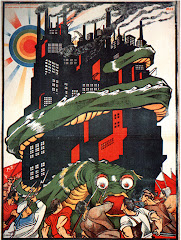Wednesday, August 10, 2011
A most interesting perspective
Dear Colleagues,
I would like to share an interesting project with you. I had gotten a letter from the China Daily, which ran the story on me back in January, to comment on a few questions they plan to deal with as a result of the S&P decision to demote the credit line of Washington. In answering the questions, some of which they may use, it occurred to me to share the ideas with you. Attached is a copy of their note to me and my response. As usual, your comments are always welcome. I have been working on a thesis generally titled “The 21st Century As An Epochal World Change In Economic Structure”.
Sincerely,
Sidney Gluck
-----Original Message-----
From: Kelly Chung Dawson
To: Sidney J. Gluck
Sent: Tue, Aug 9, 2011 7:50 am
Subject: China Daily request for comment on how stock market crisis might affect China
Mr. Gluck
China Daily is preparing a story on how the current stock market crisis might affect the Chinese economy, and I was hoping you might be willing to comment. If you are, below are some questions (feel free to answer as many/few as you have the time for).
Thanks!
Questions:
1. Is the slump of the world's stock markets following the S&P's downgrade a true reflection of where the world's economy is going?
2. How will the US debt crisis affect the Chinese economy? Will China's exports slow down due to weaker global demand? If the world's economy turns worse, will China's imports from the rest of the world be affected?
3. What should China do if the world's economy goes to another recession? Another stimulus package?
4. Do you have any predictions for what will happen with the RMB? Will it appreciate faster to help tame China's inflation or slower to help the ailing exports sector in case of a world recession?
Best,
Kelly Chung Dawson
Reporter
China Daily USA
-----Original Message-----
From: Sidney J. Gluck
To: Kelly Dawson at China Daily
Sent: Wed, Aug 10, 2011 1:37 pm
Subject: Re: China Daily request for comment on how stock market crisis might affect China
Dear Ms. Dawson,
I appreciate your request for comments. Here goes from the top of my head and my heart.
As an overall introduction, I believe the 21st century is an epoch of world change that is in some ways similar to the change from feudalism to capitalism. Capitalism has done a great job in building industry based upon wage labor and the free movement of former landlocked peasants. China is going through some of that process now with the development of an industrialized society and will no doubt be the first nation to develop a high tech industrialized society with the use of both private capital and government social capital while also developing socio-economic supports for its population which in some ways resemble the welfare state that sustained capitalism but is basically a part of a socialist program which seeks to develop harmony among the collective economic levels.
My answers to your questions follow:
Question 1:
Standard & Poor must be commended for being the first important institution in the capitalist system to take an objective view of the conditions among the varied countries. For truth, the dominance of US finance capital is a bulwark to the system on a worldwide scale. We have witnessed a shift in the past twenty years that had begun with the Reagan administration to the investment pattern, especially in the USA, from building new industry and high tech, which would continue job creation or pick up shifts in particular industries that would utilize the existing labor force. Fact is that the industrial structure of the USA in particular has decreased with the export of capital to cheap labor countries where US companies invested in China are now looking to move to countries like India and other former colonial countries for cheap labor.
As a result, when our country was driven into an economic crisis in 2008 China bearing the shock brought its country to a relative equilibrium but then has been affected by inflation generated by higher costs of imports. Wall Street recovered from the economic crisis but left behind what is now 14 million unemployed and no prospects of industrial growth to re-absorb them in productive and life supporting activities. Beyond that, inflation has been magnified, affecting China’s imports and creating serious price increases which it is now dealing with by increasing minimum wage laws, increasing the amount of workers non-taxable base in their income and hence their tax to the government and consideration is now being given to increasing one of the relatively low levels of taxation among the wealthy group growing in China whether personal or corporate and insisting upon corporate negotiation with a growing labor movement.
S&P’s alarm was inevitable because the distorted personal accumulation in all western countries and the USA has generated government debts for lack of taxation of high incomes and failure of governments to become involved in industrial development with one exception, Germany does not find itself in the same straits. Having first created a welfare state in the 19th century, they are maintaining it because of the multiplicity of political parties representing various economic sectors and the decision to trade and exchange with China that is a bridge supporting its own continuation.
We hear now suggestions of solutions that German banks pull Western European countries out of their financial tangles and failure of growth. Germany’s welfare state will not include these countries and will continue on its own independent economic direction. I do believe also that they will learn much from China because the two economic poles of the 21st century are a reality, especially with the development of BRICS, which is now planning a 2012 massive conference of developing countries and industrial development, job creation, and the end of colonial exploitation. So thanks to Standard & Poor’s for opening the eyes of the world a signal that change is necessary.
Question 2:
The world economy is changing. This century is making new history by creating economic relations around the world that aid in the industrialization of countries that have been exploited for hundreds of years by foreign powers. This is the major change that is taking place with China as an example of the possibilities. Once the privatization impulse in the growing economies among former colonial countries will be diminished in combinations of private and social support of economic development. This will be the new epochal impetus.
There will be an effect on China with exports to countries whose economic growth has been stalled. However, on the contrary, there will be an increase in exports to developing countries that are, in the last analysis, the world’s majority. Furthermore, the planned economy in China has the capability of capital formations both for industrial development and growing social necessities. There may be some problem with foreign investment; but then again, I suspect that finance capital from the West will invest in the development of China because they need it for their own survival.
The great danger is not economic failure because countries will be developing along with China, which now has a substantial base. The great danger is the possibility of war generated by the Pentagon. What is not fully known by the public is that President Obama’s position on dealing with international relations with China is based upon dealing with objective differences by using diplomacy rather than the military. (Note to the Editor: I say this because I had some hand in shaping his ideas. A copy of a letter received from the President in June of this year attests to his diplomatic approach in relations with China and enunciates his position, which differs from the Pentagon, State Department, and the military budget. This is for your information and may be used in a helpful manner. You will note from the copy of the attached letter received from the President only last June. You may use any of this any way you like, but you should know it.)
In sum, the world’s economy that had been dominated by private capital will probably turn worse; but the world as a whole will be on the upturn/ and create the possibility for economic stability as changes take place in the flow of private capital. China’s position as the second highest producer in the world, though it must produce three times as much to reach their per capita production which it will accomplish with its own as well as foreign capital and stimulate intensive growth as the effect of colonialism ends.
Question 3:
The question must be answered from two distinct competing conditions. The dominant one, at this time, is the failure of private capital investments and industrial growth. On the other hand, industrialization, on a wider scale than ever, is now emerging. BRICS is in the process of developing economic relationships among nations devoid of military structuring and expense. This newly developing organization represents the growing majority of the world’s peoples and countries even encompassing a controlled participation by foreign capital within its confines. But then again, in a changing world, that too can be augmented, nation by nation, adding overall national planning to their development as a change from planning by individual corporations based purely on their profitability rather than national growth.
Ultimately, we may be witnessing the worst and the last as planned economies are adopted by the developing former colonial countries, some of which are already on that track. Another stimulus package that might evolve will be strictly within the existing Western countries that will have to find ways in taxing private accumulations and inducing private and government investment to re-establish industrial development and job creation for their people. It might even be some form of redistribution of wealth in the form of legitimate and affordable taxes or eliminating concessions on tax rates that have been a gift to the wealthy and which, in many ways, has led to their present crisis.
Question 4:
As for your last question, the effect on the RMB is sadly a tough one. No doubt the action of S&P might affect the value of the RMB but not necessarily. Nonetheless, the truth it revealed on the direction of not only the US economy but that of the European capitalist nations could affect the RMB. However, the developing part of the world will accelerate despite the crises in capitalist countries, and private capital will still be investing in the growth economies, as we know from the experience with China. Furthermore, I do anticipate that accumulated private capital will still invest in China and in other large developing countries and some among the smaller countries. China’s holdings of US bonds may suffer in the process, but the RMB is not immediately affected by the movement of foreign capital and depends a good deal upon the planned banking system in China. While it is true that the currencies of many countries will be affected, I do not consider the RMB to be in the same category as the dollar, the pound, the franc, etc. in the West.
Why? The RMB’s control is in the hands of the government in China. This is not true of the Western countries. What China must carefully consider is the indebtedness of internal regional government and economic enterprises and its relation to the central planning functions and decisions. In other words, there are more possibilities for the RMB to protect itself than we are witnessing in other parts of the world. The specifics in many ways will depend on the rapidity with which industrialization grows in the developing part of the world and the role that China will no doubt be able to play in stimulating positive economic and social growth and avoiding negative expenditures for the military.
As for the export sector, it might be the necessity to reduce the profitability and accumulation by the government and private capital, domestic and foreign.
The one strength that China has, nonexistent in the West, is its national economic planning as well as the reduction private capital influence though it must be sensitive to maintaining conditions that attract investments needed for further growth. However, economic growth in China is a central part of the national plan and the federalization of the political scene together with development of democratic forms are inevitable and will also be helpful. With such experiences and possibilities, the RMB is not in danger as major Western currencies.
After all, China has inherited more contradictions of its own than the rest of the world living through eco-social relations of feudalism and wage labor and the combination of private and social capital in a high tech wage labor system. It is the most complex society and economy that has ever existed. But its economic and social structure embodies a philosophical approach based upon creating the well-being of a productive population which will become the first nation to succeed in building a high tech industrialized society despite the multiple contradictions and improve the conditions of all of its people. That is the new society that will show its strength in the 21stcentury.
I have answered all the questions from my distinctive point of view which is based on belief that China, with all its problems, is developing a Harmonious Society and ultimately will flower into socialism when the human nature of all its people on all economic levels achieve collectivity in their desire to have China succeed and create conditions for an ultimate growth into communism where the level of production and consumption are enough to take care of all of their people and fulfill Marx’s prediction “from each according to their ability, to each according to their need”; an ultimate return to the human relations in the beginning of tribal communal society before the development of classes.
Sincerely,
Sidney Gluck
Subscribe to:
Comments (Atom)





































